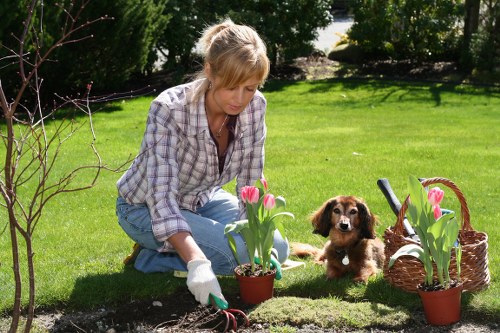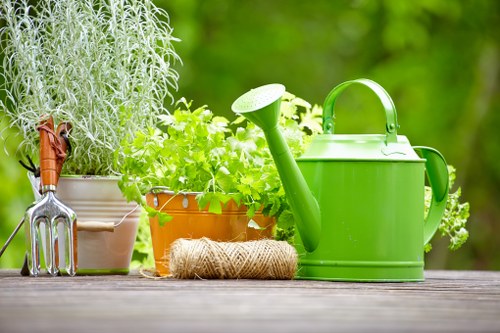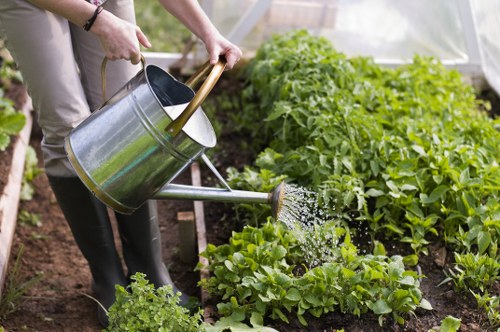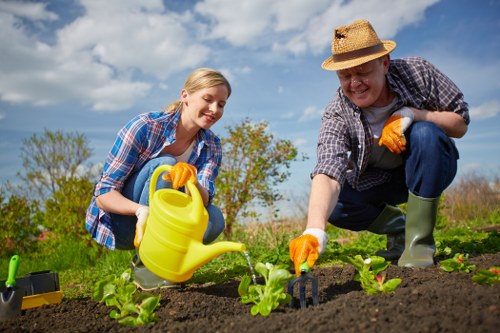Comprehensive Guide to Garden Maintenance in Box Hill
Introduction to Garden Maintenance

Maintaining a beautiful garden requires dedication, knowledge, and the right resources. In Box Hill, where the climate and soil conditions are unique, effective garden maintenance strategies are essential for flourishing plants and vibrant landscapes.
Whether you're a seasoned gardener or a beginner, understanding the basics of garden upkeep can transform your outdoor space into a serene and picturesque environment. This guide covers everything from routine care to specialized techniques tailored for Box Hill's specific conditions.
In the following sections, we'll explore various aspects of garden maintenance, including seasonal tasks, pest control, soil management, and the importance of professional services. By implementing these practices, you can ensure your garden remains healthy and stunning throughout the year.
The Importance of Regular Maintenance

Regular garden maintenance is crucial for several reasons. It not only enhances the aesthetic appeal of your property but also promotes the health and longevity of your plants. Consistent care helps prevent diseases, control pests, and address any emerging issues before they escalate.
In Box Hill, where weather patterns can be unpredictable, staying on top of garden tasks ensures your plants can withstand sudden changes. From pruning and weeding to fertilizing and watering, each activity plays a vital role in maintaining a thriving garden.
Moreover, a well-maintained garden can increase property value, provide a relaxing outdoor space, and contribute to the overall well-being of residents. Investing time and effort into garden maintenance yields long-term benefits that go beyond mere aesthetics.
Seasonal Garden Maintenance Tips

Spring
Spring is a critical season for garden maintenance in Box Hill. As the weather warms, it's time to prepare your garden for the growing season ahead.
- **Pruning:** Trim back any dead or overgrown branches to encourage healthy growth.
- **Weeding:** Remove weeds that have taken root during the winter months to reduce competition for nutrients.
- **Soil Preparation:** Enrich the soil with compost or organic matter to provide essential nutrients for your plants.
Summer
During the summer, focus on watering, pest control, and maintaining plant health under the intense heat.
- **Consistent Watering:** Ensure plants receive adequate moisture, especially during dry spells.
- **Pest Management:** Monitor for pests and diseases, and take appropriate measures to address any issues.
- **Mulching:** Apply mulch to retain soil moisture and regulate temperature.
Autumn
Autumn is the perfect time to prepare your garden for the colder months ahead.
- **Leaf Removal:** Clear fallen leaves to prevent fungal growth and maintain garden cleanliness.
- **Planting:** Plant bulbs and other perennials that will bloom in the spring.
- **Soil Amendment:** Add compost to replenish the soil's nutrients after the growing season.
Winter
Even in winter, garden maintenance is essential to protect your plants and prepare for the next growing season.
- **Protective Coverings:** Use frost cloths or other coverings to protect sensitive plants from freezing temperatures.
- **Tool Maintenance:** Clean and store gardening tools properly to extend their lifespan.
- **Planning:** Use the winter months to plan and design new areas for your garden.
Soil Management and Fertilization

Healthy soil is the foundation of a thriving garden. Proper soil management ensures that plants receive the necessary nutrients and have the right conditions to grow.
In Box Hill, the soil composition can vary, so it's important to test your soil's pH levels and nutrient content. Based on the results, you can make informed decisions about adding fertilizers or soil conditioners.
Organic fertilizers are highly recommended as they improve soil structure, enhance microbial activity, and provide a slow release of nutrients. Additionally, incorporating mulch can help retain moisture and prevent soil erosion.
Pest and Disease Control

Pests and diseases can quickly damage your garden if not addressed promptly. Integrated Pest Management (IPM) is an effective strategy that combines biological, cultural, and chemical methods to control pests with minimal impact on the environment.
Regularly inspecting your plants for signs of pests or diseases allows you to take swift action. Introducing beneficial insects, such as ladybugs and praying mantises, can naturally reduce pest populations.
For more severe infestations, use eco-friendly pesticides and follow guidelines to ensure the safety of your plants and surrounding ecosystem.
Pruning and Trimming Techniques
Why Pruning is Essential
Pruning helps maintain the shape and health of your plants by removing dead or diseased branches and encouraging new growth. Regular pruning improves air circulation, reduces the risk of fungal infections, and enhances the overall appearance of your garden.
Proper Pruning Methods
Different plants require different pruning techniques. Here are some general guidelines:
- **Use Sharp Tools:** Ensure your pruning shears and tools are clean and sharp to make precise cuts.
- **Cut at the Right Angle:** Make cuts at a 45-degree angle to prevent water from accumulating and causing rot.
- **Remove Deadwood:** Always remove any branches that are dead, diseased, or damaged.
- **Shape for Growth:** Trim plants to your desired shape, allowing enough space for them to grow without becoming overcrowded.
Timing Your Pruning
The best time to prune depends on the type of plant. Generally, late winter or early spring is ideal for most deciduous trees and shrubs, while summer pruning is suitable for spring-flowering plants.
Watering Strategies for a Healthy Garden
Proper watering is critical for maintaining a healthy garden. Overwatering can lead to root rot and other issues, while underwatering can cause plants to wilt and stunt growth.
Implementing efficient watering practices can conserve water and ensure your plants receive the right amount of moisture. Here are some tips:
- **Deep Watering:** Water deeply but less frequently to encourage strong root growth.
- **Time of Day:** Water early in the morning or late in the evening to reduce evaporation.
- **Use Mulch:** Mulching helps retain soil moisture and keeps roots cool.
Installing Irrigation Systems
For larger gardens, installing an irrigation system can streamline the watering process. Automated systems ensure consistent watering schedules and can be adjusted based on weather conditions.
Drip irrigation is particularly effective as it delivers water directly to the plant roots, minimizing waste and reducing the risk of disease.
Rainwater Harvesting
Consider setting up a rainwater harvesting system to collect and store rainwater for garden use. This eco-friendly approach reduces your dependence on municipal water sources and provides a sustainable watering option.
Choosing the Right Plants for Box Hill
Selecting plants that thrive in Box Hill's climate and soil conditions is fundamental to successful garden maintenance. Native plants are often the best choice as they are adapted to the local environment and require less maintenance.
Here are some plant suggestions suitable for Box Hill gardens:
- **Lavender:** A hardy plant that attracts pollinators and adds a pleasant fragrance.
- **Hostas:** Ideal for shaded areas, providing lush foliage and vibrant blooms.
- **Roses:** Classic and versatile, roses can be cultivated in various climates with proper care.
- **Eucalyptus:** Offers aromatic leaves and serves as an excellent backdrop in garden designs.
- **Geraniums:** Brighten up spaces with their colorful flowers and are relatively easy to maintain.
Seasonal Flowering Plants
Incorporate seasonal flowering plants to ensure continuous blooms throughout the year. This approach not only enhances the garden's beauty but also supports local pollinators.
Perennials vs. Annuals
Understanding the difference between perennials and annuals is key to planning your garden. Perennials return year after year, providing long-term structure, while annuals offer seasonal bursts of color.
Mulching and Its Benefits
Mulching is a simple yet effective garden maintenance practice. It involves covering the soil with organic or inorganic materials to conserve moisture, suppress weeds, and regulate soil temperature.
Benefits of mulching include:
- **Moisture Retention:** Helps maintain consistent soil moisture levels, reducing the need for frequent watering.
- **Weed Control:** Prevents weed seeds from germinating by blocking sunlight.
- **Soil Protection:** Shields the soil from erosion and compaction caused by heavy rainfall or foot traffic.
- **Temperature Regulation:** Keeps the soil cooler in summer and warmer in winter.
Choosing the Right Mulch
There are various types of mulch available, each with its own advantages:
- **Organic Mulch:** Includes materials like bark, straw, and compost. It enriches the soil as it breaks down.
- **Inorganic Mulch:** Comprises materials such as gravel, rocks, and rubber. It is long-lasting and ideal for pathways and borders.
- **Mulch Alternatives:** Consider using living mulches like ground covers or cover crops for additional benefits.
Application Techniques
To maximize the benefits of mulching, apply a 2-3 inch layer around your plants. Avoid piling mulch directly against plant stems or tree trunks to prevent rot and disease.
Pruning and Trimming Techniques

Pruning helps maintain the shape and health of your plants by removing dead or diseased branches and encouraging new growth. Regular pruning improves air circulation, reduces the risk of fungal infections, and enhances the overall appearance of your garden.
Different plants require different pruning techniques. Ensure you understand the specific needs of each plant in your garden to apply the correct method.
Remember to use clean, sharp tools to make precise cuts, and always follow the appropriate timing for pruning each type of plant. This practice not only promotes healthy growth but also extends the lifespan of your plants.
Local Services and Professional Help
While DIY garden maintenance is rewarding, sometimes professional assistance is necessary to achieve the best results. Local garden maintenance services in Box Hill offer expert knowledge and specialized skills tailored to the unique conditions of the area.
Hiring professionals can save time and ensure that your garden receives the appropriate care it needs. From regular mowing and pruning to complex landscaping projects, professional services can handle a wide range of tasks effectively.
Additionally, professionals can provide valuable advice on plant selection, pest control, and soil management, helping you make informed decisions to enhance your garden's beauty and health.
Finding the Right Service Provider
When selecting a garden maintenance service in Box Hill, consider the following factors:
- **Experience:** Look for companies with a proven track record and expertise in garden maintenance.
- **Services Offered:** Ensure they provide the specific services you need, whether it's regular upkeep or specialized landscaping.
- **Customer Reviews:** Check testimonials and reviews to gauge the quality of their work and customer satisfaction.
- **Pricing:** Compare pricing structures to find a service that fits your budget without compromising on quality.
Benefits of Professional Maintenance
Engaging professional garden maintenance services offers several advantages:
- **Time-Saving:** Free up your schedule by delegating garden tasks to experts.
- **Expertise:** Benefit from professional knowledge and techniques that ensure optimal garden health.
- **Consistency:** Maintain a consistently well-kept garden with regular professional visits.
- **Enhanced Aesthetics:** Achieve a beautifully landscaped garden that enhances your property's curb appeal.
Contact Us Today
For top-notch garden maintenance services in Box Hill, contact us today. Our team of experts is dedicated to helping you achieve a stunning and healthy garden all year round.
Exploring Nearby Areas for Garden Services
Box Hill is surrounded by several charming neighborhoods, each with its own unique appeal. If you live in one of these nearby areas, our garden maintenance services are readily available to cater to your specific needs.
- **Mount Waverley** - Just a few kilometers from Box Hill, Mount Waverley boasts picturesque gardens and well-maintained parks.
- **Burwood** - Known for its vibrant community and lush green spaces, Burwood is an ideal location for professional gardening services.
- **Surrey Hills - Surrounded by rolling hills and expansive gardens, Surrey Hills residents can benefit from specialized garden maintenance.
- **Chadstone - With its mix of residential and commercial areas, Chadstone offers diverse gardening opportunities.
- **Forest Hill - This leafy suburb is perfect for those seeking comprehensive garden care and landscaping solutions.
- **Blackburn - Blackburn features a variety of plant species, making professional maintenance essential for keeping gardens vibrant.
- **Glen Iris - Glen Iris residents enjoy beautiful gardens that require regular upkeep to maintain their charm.
- **Mont Albert - Known for its elegant homes and well-kept gardens, Mont Albert is a prime area for garden maintenance services.
- **Doncaster - With its spacious properties and extensive gardens, Doncaster is an excellent market for professional gardeners.
- **Jordanville - Jordanville's serene environment and diverse plant life make it a great area for garden maintenance experts.
- **Templestowe - Templestowe's natural beauty and abundant gardens benefit greatly from regular professional care.
- **Brighton East - Brighton East offers a variety of garden styles that require specialized maintenance techniques.
- **Ashburton - Ashburton's community-oriented neighborhoods are perfect for comprehensive garden maintenance services.
- **Heathmont - Heathmont's unique landscape features necessitate tailored garden maintenance approaches.
- **Kew - Kew's historic gardens and modern landscapes alike can be maintained to perfection with our services.
Unique Features of Each Area
Each neighboring area around Box Hill offers distinct features that influence garden maintenance needs. Understanding these characteristics allows for more personalized and effective gardening solutions.
Mount Waverley
Mount Waverley's gardens often include traditional English-style plantings and require meticulous care to maintain their classic appeal.
Burwood
In Burwood, the presence of both residential and commercial gardens means services must be versatile and adaptable to different garden types.
Surrey Hills
Surrey Hills' rolling landscapes and extensive greenery demand robust maintenance strategies to preserve their natural beauty.
Sustainable Gardening Practices
Embracing sustainable gardening practices not only benefits the environment but also enhances the health and resilience of your garden. Implementing eco-friendly techniques can reduce your garden's carbon footprint and promote a more balanced ecosystem.
Composting
Composting organic waste from your garden recycles nutrients back into the soil, improving its fertility and structure. It reduces the need for chemical fertilizers and supports beneficial microorganisms.
Water Conservation
Adopting water-saving methods, such as drip irrigation and rainwater harvesting, ensures your garden remains hydrated without overusing valuable water resources.
Native Plants
Incorporating native plants into your garden supports local wildlife and requires less maintenance, as they are naturally adapted to the local climate and soil conditions.
Reducing Chemical Usage
Minimize the use of pesticides and herbicides by opting for organic alternatives and encouraging natural pest predators. This approach maintains a healthier ecosystem and safer garden environment.
Creating Wildlife-Friendly Gardens
Design your garden to attract beneficial insects, birds, and other wildlife. Providing habitats and food sources enhances biodiversity and contributes to a balanced garden ecosystem.
Tools and Equipment for Effective Maintenance
Having the right tools and equipment is essential for efficient garden maintenance. Quality tools not only make tasks easier but also ensure that work is done effectively and safely.
Essential Gardening Tools
- **Pruning Shears:** For trimming and shaping plants.
- **Garden Fork:** Ideal for aerating soil and removing weeds.
- **Rakes:** Useful for gathering leaves and leveling soil.
- **Shovels:** Essential for digging and planting.
- **Watering Can or Hose:** For delivering water to your plants.
Advanced Equipment
For larger gardens, investing in advanced equipment can significantly improve maintenance efficiency:
- **Lawn Mowers:** Keep your grass neatly trimmed and healthy.
- **Leaf Blowers:** Quickly clear debris and fallen leaves.
- **Electric or Gas Trimmers:** Perfect for maintaining edges and hard-to-reach areas.
- **Wheelbarrows:** Facilitate the movement of soil, compost, and tools.
Maintenance of Tools
Regularly maintaining your gardening tools extends their lifespan and ensures they perform optimally. Clean tools after each use, sharpen blades, and store them in a dry place to prevent rust and damage.
Safety Considerations
Always prioritize safety when using gardening tools and equipment. Wear protective gear, follow manufacturer instructions, and handle tools with care to prevent accidents and injuries.
Investing in Quality
Investing in high-quality tools may require a higher initial expenditure but pays off in the long run through durability and performance. Quality tools make garden maintenance tasks more manageable and enjoyable, allowing you to achieve better results with less effort.
Final Thoughts on Garden Maintenance
Maintaining a beautiful and healthy garden in Box Hill is a rewarding endeavor that requires a combination of knowledge, effort, and the right resources. By following the guidelines outlined in this comprehensive guide, you can ensure your garden thrives throughout the year.
Whether you're tackling garden maintenance on your own or seeking professional assistance, understanding the key aspects of soil management, pest control, pruning, and sustainable practices is essential. Embrace these practices to create a vibrant and resilient garden that enhances your living space and connects you with nature.
Get Started Today
Don't wait to transform your garden into a stunning oasis. Book your garden maintenance service now and experience the difference professional care can make for your outdoor space.
